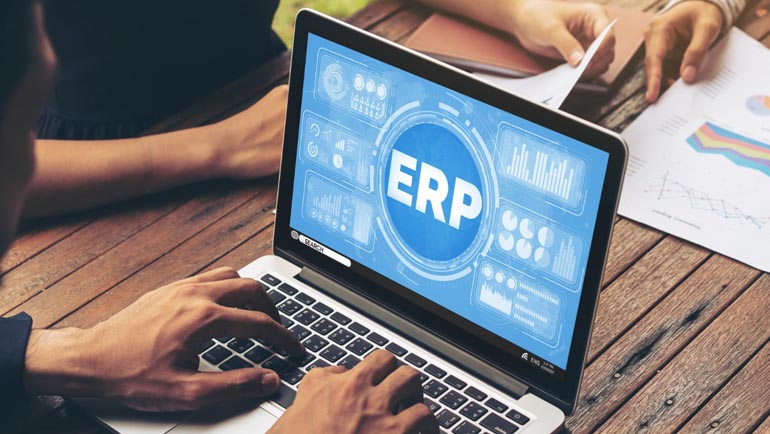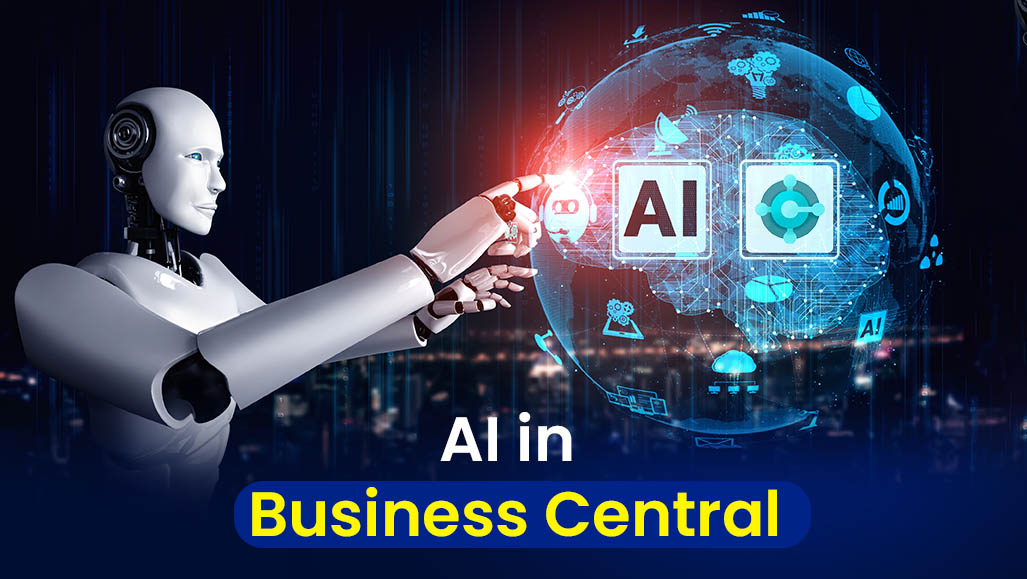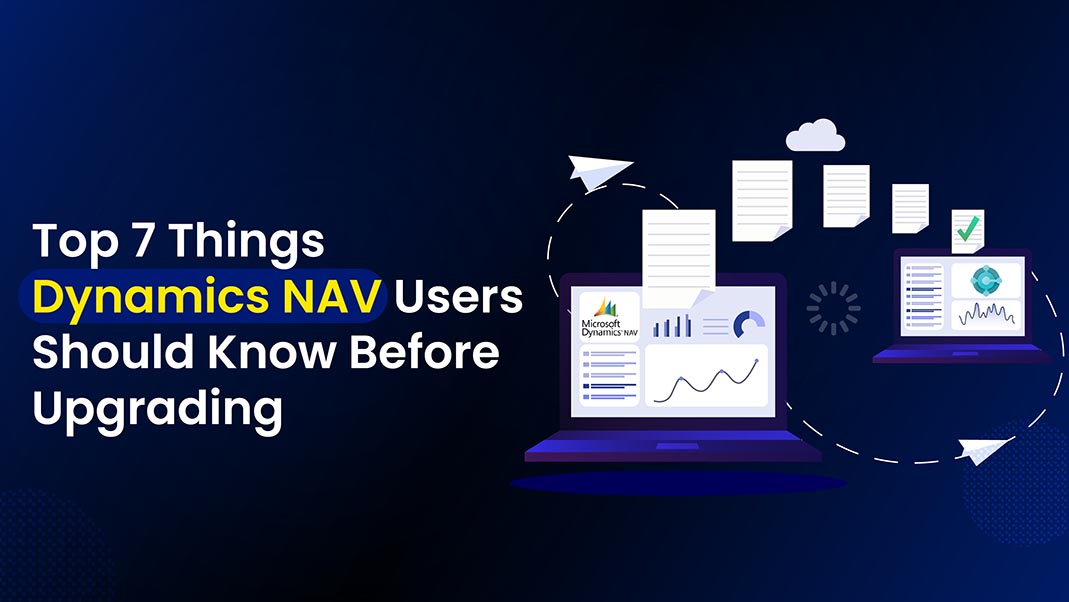The Best ERP Systems for Small Businesses in 2024
The ERP (Enterprise Resource Planning) solutions for the small business market are filled with a wide range of options, each with its unique features and capabilities. As a small business owner, choosing the best ERP solutions can be a daunting task.
The global cloud ERP market size underscores this point. Valued at USD 49.80 billion in 2023, the market is projected to reach a staggering USD 181.04 billion by 2032, exhibiting a CAGR of 15.5%. This soaring growth reflects the increasing need for powerful and user-friendly business management tools.
In 2024, businesses need the best cloud ERP software that is powerful, adaptable, easy to use, and are perfect fit for your company’s specific needs.
This article explores the top 10 best ERP systems for small businesses, including Microsoft Business Central. Find the best ERP software for a small business that fits your company!
1. Microsoft Dynamics 365 Business Central
Microsoft Dynamics 365 Business Central (formerly Dynamics NAV) is your All-in-One Business Management Tool.
Dynamic 365 Business Central is a full suite of advanced business applications hosted securely on Microsoft’s Azure cloud. Acts as a central command center for your company, managing finances, accounts, sales, purchases, warehouse, inventory, customer relationships, HR, and projects in a single, user-friendly platform for enhanced efficiency and streamlined operations.
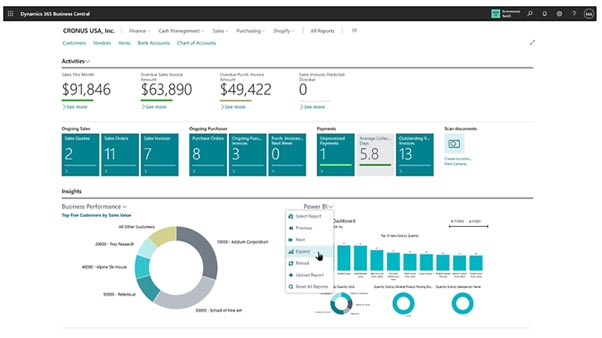
Key Features of Microsoft Dynamics 365 Business Central
- This cloud-based ERP system allows users to access from anywhere with an internet connection, using web browsers, mobile devices, desktops, and tablets.
- Microsoft Business Central out-of-the-box integration with tools like Outlook, Excel, and Word for effortless collaboration.
- Automates billing and accounting tasks with built-in AI.
- Gain real-time business intelligence with Power BI to make faster decisions.
- Expand D365 Business Central’s capabilities with a marketplace full of third-party apps and add-ons, like “Mobile WMS” for warehouse management.
- For advanced users, Dynamics 365 Business Central offers customization tools like APIs and VS Code.
- Prioritizes security in Business Central licensing and adheres to global regulations.
- For machine connectivity, IoT integration frameworks are included.
- Find anything quickly with the handy “Tell Me” feature.
Suitable For: D365 Business Central pricing is ideal for growing businesses, distributors, manufacturers, and professional services that want an ERP system for small businesses to manage up to 500 plus daily transactions. It can handle single users or teams of up to 300 plus employees.
Considering Microsoft Business Central?
- Explore Business Central pricing to find the right plan for your budget.
- Choose the right Business Central implementation partners to ensure smooth implementation.
- Pick an appropriate Microsoft Business Central licensing option for your user (business) needs.
- Leverage the scalability and remote access of the Dynamics Business Central cloud.
Evaluate these factors to see if Business Central is the best fit for your ERP needs.
2. Oracle NetSuite
Oracle NetSuite is a cloud-based ERP system offering a comprehensive suite of integrated business applications. With its reporting and analytics tools, NetSuite helps small businesses make data-driven decisions and optimize their performance.
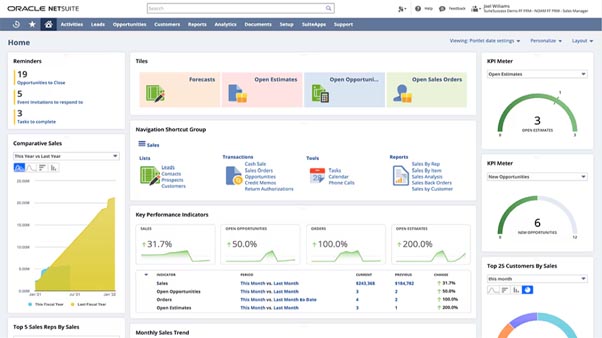
Key Features of Oracle NetSuite
- Provides instant insights with pre-built dashboards, reports, and Key performance indicators (KPI).
- Manage everything from controlling accounting, order processing, inventory management, production, supply chain, and warehouse operations with their all-in-one suite of applications.
- Gain a 360-degree view of your multiple subsidiaries, business units, and legal entities.
- Get instant access to all your financial information, operational data, and transactions happening across your entire company.
Suitable For: Oracle NetSuite is for businesses seeking a scalable and adaptable small business ERP solution to manage their growing operations.
3. SAP Business One
SAP Business One is a top ERP software offering a robust and versatile platform to streamline operations, improve efficiency, and gain better control over financial and business data. It is a client-server-based application that can be deployed on-premises or in the cloud.
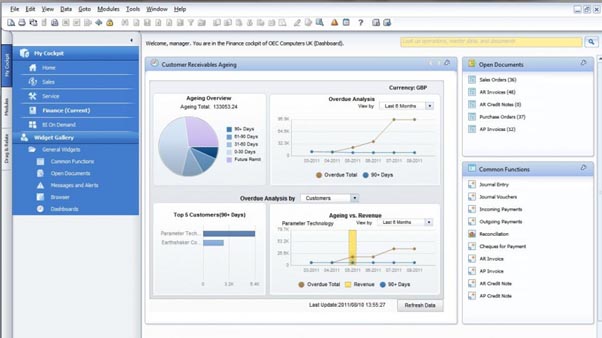
Key Features
- SAP B1 is utilized by SMBs but scales to meet your growing business needs.
- Reduce costs across financials, purchasing, inventory, and more with AI-driven analytics.
- Gain complete visibility and control over every aspect of your company.
- Get a clear, single view of your business with a user-friendly interface.
4. SAP (S/4HANA Cloud and SAP Business By Design)
SAP S/4HANA Cloud is a next-generation ERP system built on SAP’s revolutionary S/4HANA in-memory database platform. It delivers real-time data processing, advanced analytics, and intelligent automation, all accessed through a modern, user-friendly interface.
This ERP is like a lighter version of SAP’s powerful systems, designed specifically for smaller businesses at an affordable price.
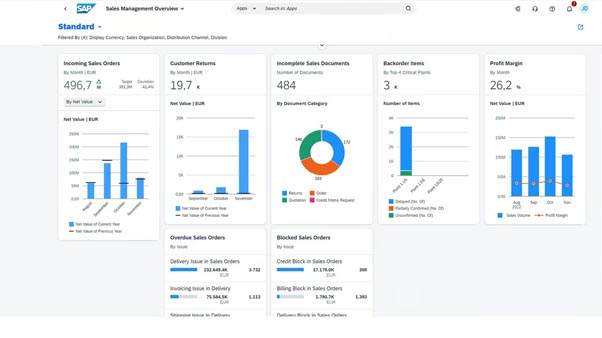
Key Features
- Leverages AI and analytics to cater to the needs of any business type.
- Enables intelligent process automation for seamless end-to-end business practices.
- Ensures data protection with embedded cybersecurity features.
- Provides complete support for adhering to key regulations.
- Empowers organizations to integrate sustainability into
5. Infor
Infor understands every industry has unique needs! Their specialized ERP systems, including Infor CloudSuite, Infor LN, and Infor M3, are built with industry-specific functionality in mind. These solutions are known for their robust financial management, supply chain optimization, and manufacturing capabilities, making them a great fit for small businesses in various industries.
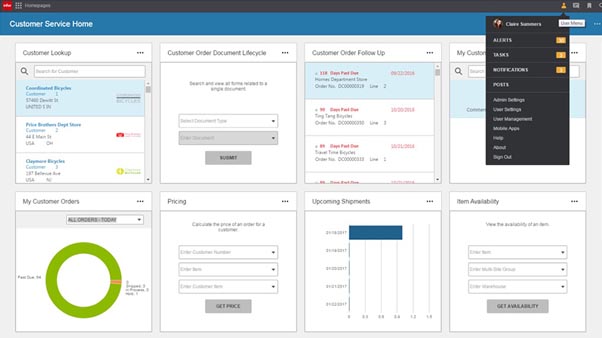
Key Features
- Connects internal & external systems for enhanced visibility, collaboration, and data-driven insights.
- Leverages AI/ML models to anticipate trends, recommend actions and deliver industry-specific insights.
- Enables hyper-scaling, automatic upgrades, and secure access to apps and data from anywhere.
6. Sage Intacct
Sage Intacct specializes in financial management and accounting. Designed for SMBs, it provides advanced reporting, multi-entity management, and real-time visibility into financial data.
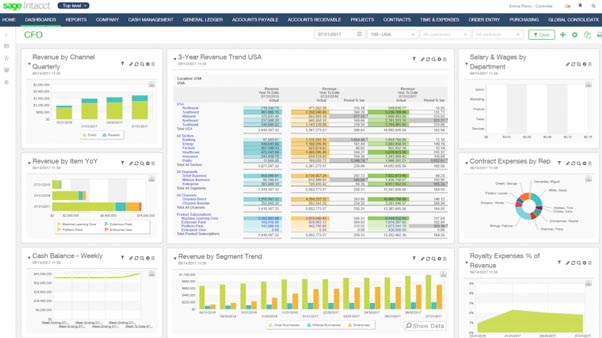
Key Features
- Offers accounting, planning, HR, and payroll solutions for small and medium businesses, all in the cloud.
- Gain instant and predictive performance insights for smarter decision-making.
- Integrates seamlessly with Salesforce CRM for a unified view of your business.
7. Epicor
Epicor ERP is a scalable and adaptable solution that can be deployed on-premises or in the cloud, providing companies with the flexibility to choose the deployment model that best fits their IT infrastructure and business requirements.
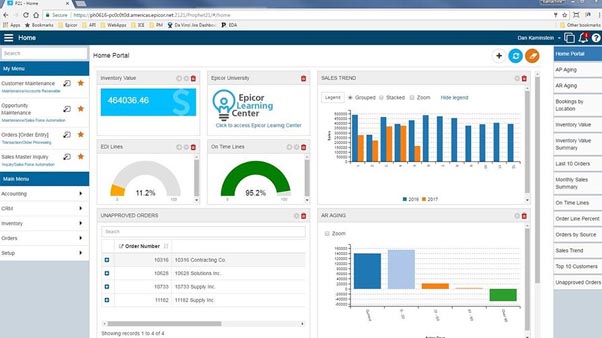
Key Features
- Manage stock with live data, integrated receipts, and purchase orders.
- Gain real-time business intelligence with built-in analytics tools.
- Manage quotes, and orders, configure products, and track opportunities – all in one place.
- Track production and processes in real time for optimal control.
8. Acumatica
Acumatica is known for its flexibility and ease of integration. Suits for businesses seeking digital resilience and wanting to connect various tools and applications. It optimizes business processes for efficiency and smoother operations.
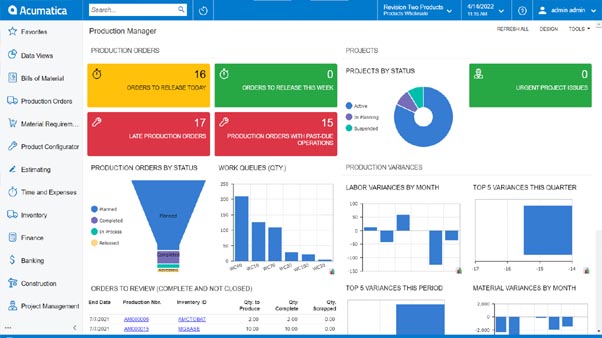
Key Features
- Built for on-the-go access and remote work scenarios.
- Ideal for growing companies seeking operational continuity, efficiency, and flexibility.
- Integrates easily with other business-critical applications.
9. SYSPRO
By providing a centralized platform for managing core business processes, SYSPRO ERP helps manufacturers and distributors streamline their operations, improve visibility, and make data-driven decisions to drive growth and profitability.
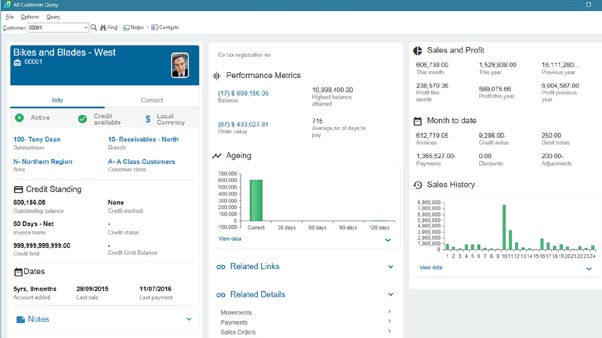
Key Features
- Interactive web platform streamlines online supplier communication.
- Integrates seamlessly with governance, compliance, and supply chain tools out-of-the-box.
- Forecast and optimize inventory with ease, allowing for varying demand sources.
- Low-code/no-code options and APIs enable connections to various applications.
- Configure pricing, discounts, and breaks for a customized approach.
10. Odoo ERP
Odoo ERP is an open-source, modular ERP solution offering a wide range of integrated business applications. Known for its flexibility and customizability, Odoo ERP has affordable pricing and extensive community support making it an attractive choice for small businesses on a budget.
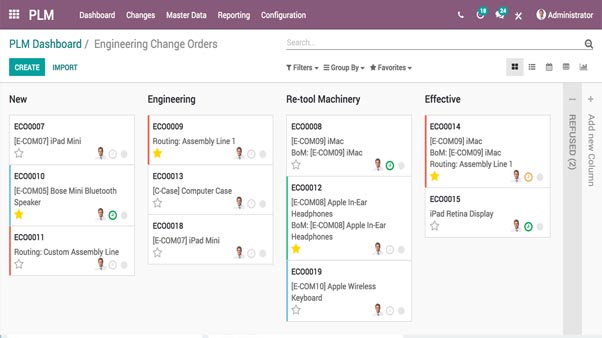
Key Features
- Fits any size and budget, growing with your business.
- Can easily connect Odoo with other applications you already use.
- Unify all operations and activities in a single, centralized platform.
- 67% of small businesses choose Odoo for its low-cost ERP solution.
As small businesses navigate the ever-evolving landscape of enterprise resource planning (ERP) solutions, the choices in 2024 are more abundant and diverse than ever before.
By considering factors such as scalability, industry-specific functionality, integration capabilities, and ease of use, small businesses can find the ERP solution that best fits their unique needs and helps them thrive in the years to come.
The top 10 ERP systems highlighted in this article offer small businesses a range of powerful tools to streamline operations, improve decision-making, and gain a competitive edge in their respective markets.
Tips to Select the Perfect ERP Software in 2024
Here at Nevas Technologies, we’ve helped businesses find the perfect fit. Here are a few key tips to guide you in your ERP software selection:
1. Understand Your “Needs”:
We often find companies want a solution that connects all their data, giving them a clear picture to make informed decisions but sometimes a simpler solution is fruitful.
If you’re unsure where to start, our Business Central consultants can help you analyze your needs. Together, we can identify the best path to boost efficiency and data-driven decision-making.
2. Build Your Dream ERP Project Team:
To ensure a smooth ERP implementation, you need a team representing key areas of your business. They’ll be the experts on your current systems and processes. By putting together the right team, you’ll be well on your way to a successful ERP implementation!
3. Explore the influencing factor:
There are many ERP options out there, each with its own merits and demerits. But instead of choosing based on their names, focus on features that directly benefit your business and help you achieve your goals. Our Business Central consultant can help you navigate options and find the perfect fit for your unique needs.
Remember, the ideal ERP solution helps your business thrive! Consider factors like scalability, industry-specific features, and ease of use. The top ERP systems offer powerful tools to streamline operations, improve decision-making, and give you a competitive edge.
Ready to find the best ERP solution? Contact Nevas Technologies today!

